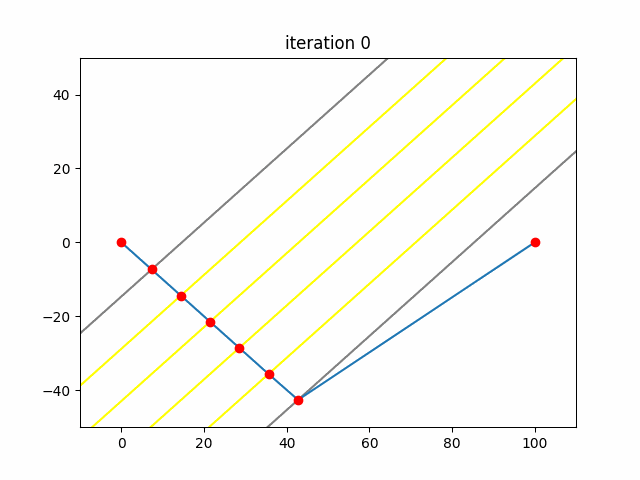Problem 607
completed November 14, 2021Comments
I’m currently taking a Machine Learning course at Portland State. We learned about Gradient Descent and its use in optimizing neural networks. I wanted to try my hand at a problem here that could also be solved using Gradient Descent.
The first thing I did was rotate the map 45 degrees so that the marsh was vertical. I then defined variables for the locations on the marsh boundaries where Sam and Frodo moved from one speed to another. Because the fastest way between any two points with a constant velocity is a straight line, these six points were all that was necessary to define their trip. Using these variables, I was then able to calculate the time it would take them to get from A to B along any given path.
Now that I had a single equation, all I needed to do was find its minimum value. Using the Gradient Descent algorithm, this meant taking the partial derivative with respect to each variable in turn. This gradient is then subtracted from the variable. Where $F$ is the equation to optimize:
\[a_{i+1}=a_i-\nabla F(a_i)=a_i-\frac{\partial}{\partial a_i}F(a_i)\]What this process does is iteratively find smaller and smaller values for the function. At each iteration, it finds the direction with the steepest descent and inches its way forward in that direction. This is analogous to a ball rolling down a hill until it finds the bottom. This gif represents Sam and Frodo’s path as the algorithm progresses.

From here it was just taking the partial derivatives and solving. Runs in about 40 milliseconds with Pypy3.
Code
alpha = (25*(2**0.5) - 25)**2
beta = 50 * (2**0.5)
def solve():
a = b = c = d = e = f = 0.001
timemin = float('inf')
while True:
time = 1/10 * (alpha + a**2)**0.5 + \
1/9 * (100 + (b - a)**2)**0.5 + \
1/8 * (100 + (c - b)**2)**0.5 + \
1/7 * (100 + (d - c)**2)**0.5 + \
1/6 * (100 + (e - d)**2)**0.5 + \
1/5 * (100 + (f - e)**2)**0.5 + \
1/10 * (alpha + (beta - f)**2)**0.5
if time < timemin:
timemin = time
elif time == timemin:
break
a -= 1/10 * a * (alpha + a**2)**(-0.5) + \
1/9 * (a - b) * (100 + (a - b)**2)**(-0.5)
b -= 1/9 * (b - a) * (100 + (b - a)**2)**(-0.5) + \
1/8 * (b - c) * (100 + (b - c)**2)**(-0.5)
c -= 1/8 * (c - b) * (100 + (c - b)**2)**(-0.5) + \
1/7 * (c - d) * (100 + (c - d)**2)**(-0.5)
d -= 1/7 * (d - c) * (100 + (d - c)**2)**(-0.5) + \
1/6 * (d - e) * (100 + (d - e)**2)**(-0.5)
e -= 1/6 * (e - d) * (100 + (e - d)**2)**(-0.5) + \
1/5 * (e - f) * (100 + (e - f)**2)**(-0.5)
f -= 1/5 * (f - e) * (100 + (f - e)**2)**(-0.5) + \
1/10 * (f - beta) * (alpha + (f - beta)**2)**(-0.5)
return round(timemin, 10)
if __name__ == '__main__':
print(solve())